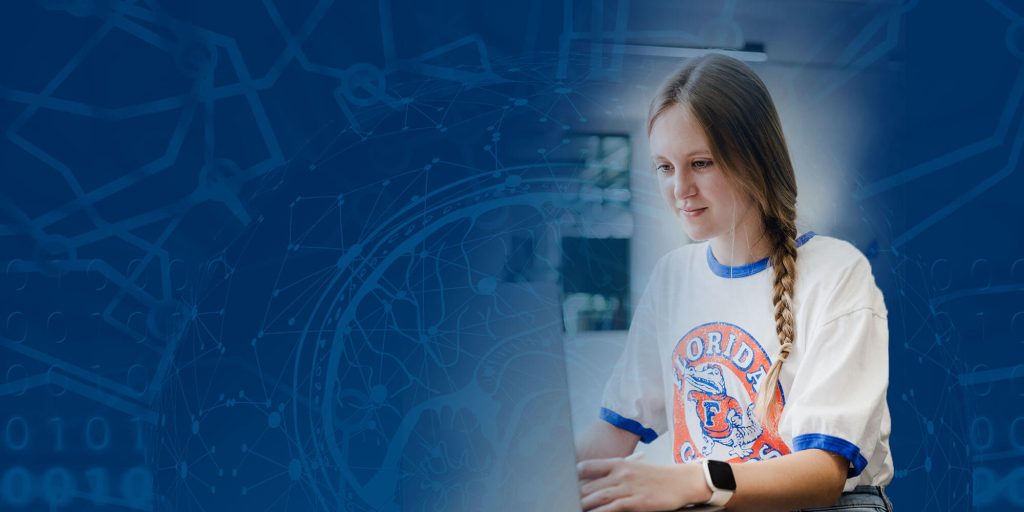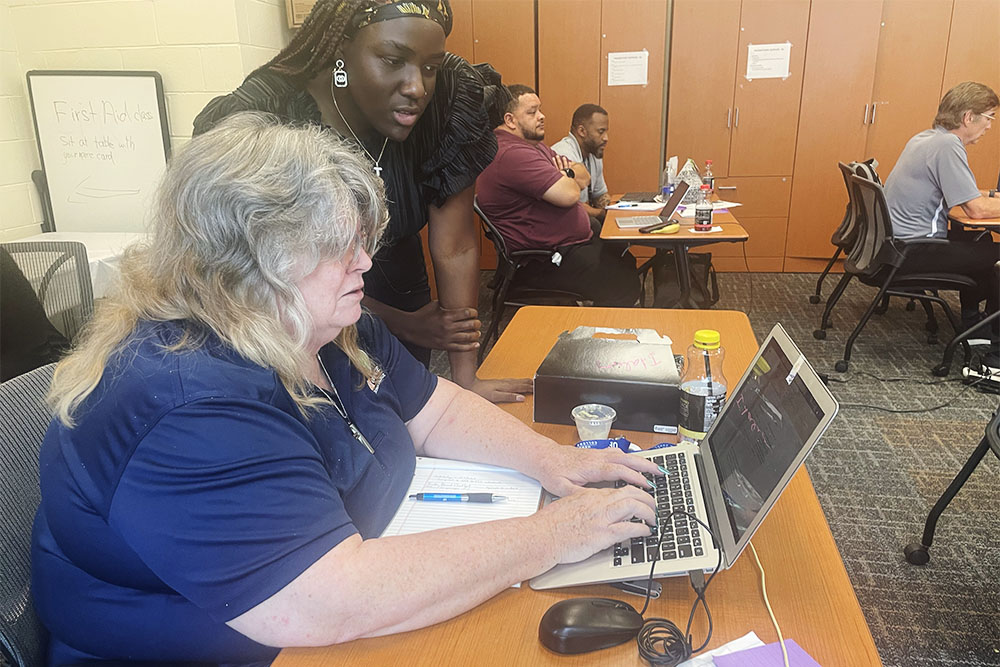
As students across the nation return to the classroom this fall, Florida is among the first states to adopt a K-12 artificial intelligence, or AI, education program designed to prepare its youth for the growing global demand for an AI-enabled workforce.
Tapping into the expertise of the University of Florida and its AI initiative, the Florida Department of Education recently added a three-year program of study called AI Foundations to its Career and Technical Education Program, or CTE, with three Florida school districts launching it this fall after specialized AI training was available to teachers over the summer.
Nearly everyone is accessing AI or being influenced by the technology every day, and that will only increase, said UF Associate Provost David Reed, Ph.D., who leads the university’s Artificial Intelligence Academic Initiative Center.
“More and more people with all levels of education and technical skills are exposed to AI, including on their phones, their watches and in their homes,” Dr. Reed said. “Through several initiatives, including an AI curriculum program developed for Florida public schools, the University of Florida aims to increase understanding among students about how their data is being used, improve their skills in computer science and also impact the AI workforce shortage.”
The framework for the public school coursework was designed with help from UF faculty, including Christina Gardner-McCune, Ph.D., who modeled it after the Artificial Intelligence for K-12 Initiative, or AI4K12. The initiative, a National Science Foundation-funded program, is developing national guidelines for teaching AI in elementary and secondary schools and is co-led by Dr. Gardner-McCune, an associate professor in the Herbert Wertheim College of Engineering Department of Computer and Information Science and Engineering.
The state’s new high school program offers courses that provide an overview of the aspects of AI, programming and machine learning to better prepare students to be successful both personally and professionally in an AI-based society, Dr. Gardner-McCune said.
“Students will gain practical, hands-on experience such as constructing chatbots, evaluating the societal impacts of AI and mastering foundational skills to become knowledgeable users of AI,” she said. “Once they complete the program, they will be armed with a portfolio of projects that demonstrates their ability in AI system design.”
UF faculty in the Wertheim College of Engineering gathered input from private industry through focus groups and a comprehensive AI Workforce Needs Industry Survey to help inform the design of the program.
“We leaned heavily on industry to learn what knowledge and skills companies are looking for in their employees,” said Cammy Abernathy, dean of the Wertheim College of Engineering. “We were able to leverage our relationships with national companies, and therefore, get a big picture of the common skills that are in demand.”

Teachers from 11 school districts across the state, as well as from the Florida Virtual School, participated in specially designed workshops this summer to prepare them to teach AI, making Florida among the first in the nation to provide professional development AI coursework to its educators free of charge. Developed and taught by UF engineering faculty and students, the training equips teachers with a foundational knowledge of AI concepts as well as practical experience in AI design.
“The power of this professional development is helping teachers understand the system thinking and engineering that go into the design of artificial intelligence so that they can help their students become ethical designers of the next generation of intelligent computers,” said Nancy Ruzycki, Ph.D., an instructional associate professor in UF’s Department of Material Science and Engineering who helped build the course framework and is lead designer of the professional development program for Florida’s teachers.
Dr. Ruzycki explained the AI course is design-oriented instead of data-science driven, meaning students learn how to apply the technology rather than how to create it. She said this approach fosters digital literacy across a variety of student populations and helps reinforce AI democratization, which ensures more people have access to the knowledge and tools of AI.
Dr. Reed said UF is establishing a broad and long path of AI learning opportunities for students from kindergarten through graduate education and into continuing education for professionals in the university’s pursuit of inclusive AI.
This summer, UF’s colleges of Engineering and Education held a variety of camps for middle school students to help make AI and computer science more accessible, particularly for students in lower-income areas. In Orlando, a three-week summer camp that was funded by Career Source of Central Florida piloted some of the new high school AI coursework. Camp DIALOGS, an NSF-funded project, introduced students from underrepresented backgrounds to AMBY, which stands for AI Made By You, helping attendees learn more about AI and computer science with its lessons now available to middle school teachers throughout Florida.
For UF students, an innovative curriculum effort integrates AI throughout degree programs at every college, so students have the chance to learn how the technology is applied in their chosen discipline, using the language and context of the field they know.
“This long-term strategy is intended to help build a workforce for the future and to ensure the next generation is prepared to be better digital citizens of the world,” Dr. Reed said.
This story was originally posted on UF News.